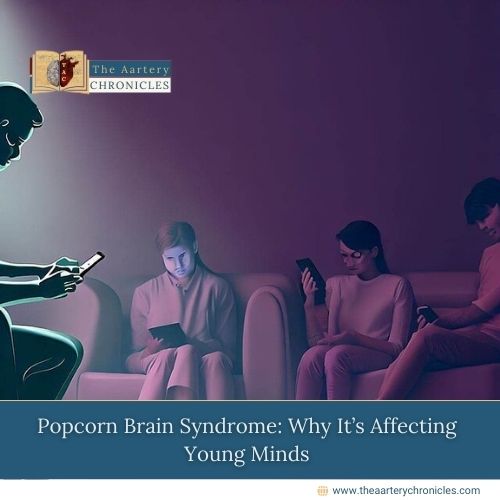

Popcorn Brain Syndrome: Why It’s Affecting Young Minds
Introduction
In today’s fast-paced digital era, the overuse of screens has led to a concerning psychological condition known as “Popcorn Brain Syndrome.” This term, coined over a decade ago, aptly describes the rapid and scattered nature of thoughts that pop up in our minds, akin to popcorn, making it challenging to focus on any single task for a significant duration.
What is Popcorn Brain Syndrome?
Do you find yourself anxious when you can’t check your phone notifications? Do you feel mentally drained after reading just a few pages of a book that you could have easily finished a few years ago? If so, you might be experiencing symptoms of Popcorn Brain Syndrome.
This condition arises primarily due to excessive screen time and the constant bombardment of digital stimuli. People suffering from it struggle with concentration, attention span, and even mental exhaustion, making it a rising concern, especially among teenagers and young adults.
The Study and Its Findings
A recent study by the psychology department at Saurashtra University sheds light on this alarming trend. Conducted on 1,364 individuals aged 15–29, the research revealed the detrimental effects of digital addiction.
Assistant Professor Dhara Doshi explained, “Many young individuals, particularly students, report difficulties concentrating on studies due to their dependency on digital gadgets. They often feel anxious when they can’t check notifications, leading to disrupted mental focus and emotional instability.”
This issue is particularly evident during exam periods when students complain about their inability to stay attentive. The research team, led by Unnati Desai and Rinka Vinzuda, emphasizes the urgent need to address this digital dependency.
The Impact of Digital Addiction
Popcorn Brain Syndrome doesn’t just affect individuals—it has societal implications too. Constant exposure to screens can lead to:
Reduced productivity: Difficulty in staying focused impacts academic and professional performance.
Mental health issues: Anxiety, stress, and emotional imbalances are common side effects.
Cognitive decline: Overstimulation hampers the brain’s ability to engage in deep, focused thinking.
How to Combat Popcorn Brain Syndrome
- Set Screen Time Limits: Allocate specific hours for screen use and stick to them.
- Digital Detox: Engage in offline activities like reading physical books, gardening, or exercising.
- Mindfulness Practices: Techniques like meditation and yoga can improve focus and reduce anxiety.
- Parental Guidance: Encourage youngsters to participate in outdoor activities and limit their gadget usage.
- Awareness Campaigns: Educational institutions and workplaces must conduct sessions on the dangers of digital addiction.
Conclusion
As digital devices become integral to our lives, it’s essential to use them responsibly. Awareness and proactive measures can help mitigate the risks of Popcorn Brain Syndrome. By fostering a balanced approach to technology, we can safeguard our mental well-being and maintain a healthier lifestyle.
Digital screens might be unavoidable, but letting them control our lives is a choice we can prevent.
Source: Inputs from various media Sources









